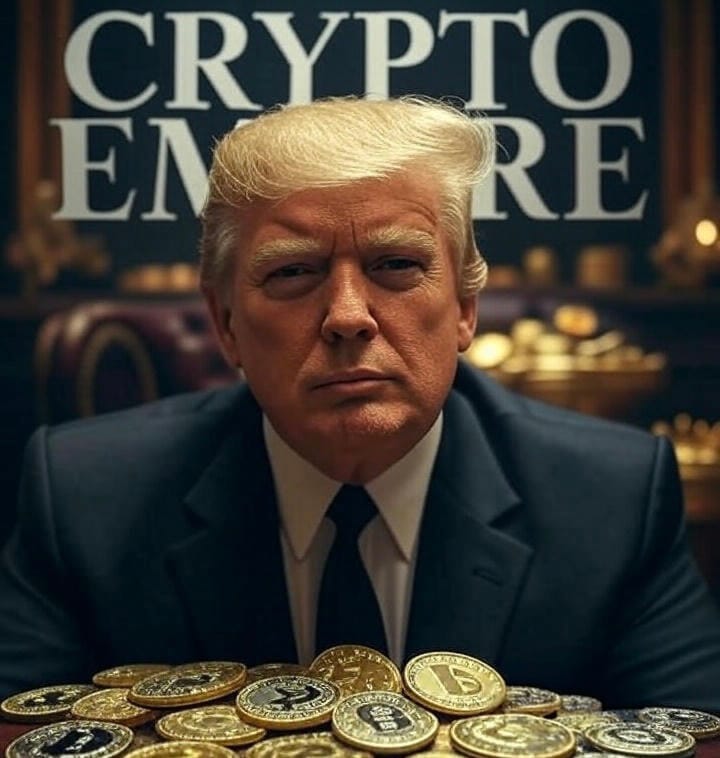Trump’s Crypto Empire: How His Family’s Ventures Doubled His Wealth in a Year

Donald Trump’s financial landscape has undergone a seismic shift since his re-election as U.S. President, with Bitcoin and cryptocurrency emerging as the cornerstone of his newfound wealth. Once a vocal skeptic of digital currencies, Trump has transformed into a crypto advocate, leveraging his position to establish lucrative ventures that have significantly enriched not only himself, but his family.
A recent short documentary by Dutch-German YouTuber ‘fern’ delves into this transformation, detailing how Trump’s strategic pivot to cryptocurrency has doubled his fortune in just one year. The documentary, a meticulous exploration of Trump’s crypto endeavors, raises questions about the intersection of private business and public policy, spotlighting ventures like the Trump memecoin and specifically, World Liberty Financial.
Stay In The Loop and Never Miss Important Crypto News
Sign up and be the first to know when we publishA Strategic Shift to Crypto Ventures
Trump’s journey from crypto critic to champion began with a stark reversal of his earlier stance. In 2019, he dismissed Bitcoin as “not money” and linked cryptocurrencies to illegal activities, but by July 2024, he was addressing a Bitcoin conference, promising to make the U.S. the “crypto capital of the planet.” This shift was driven by both political strategy and financial opportunity. With over 50 million Americans owning crypto and advocacy groups pushing for lighter regulation, aligning with the crypto community became a savvy political move. The documentary highlights how Trump’s sons, Donald Jr. and Eric, played a pivotal role in convincing him that crypto could be a financial windfall. Their efforts began with an NFT collection in 2022 and culminated in the launch of two major ventures: a Trump-branded memecoin and World Liberty Financial, a crypto bank.
The Trump memecoin simply called $TRUMP, launched on January 17, 2025, which quickly became a success, despite its disclaimer as a non-investment product. Controlled largely by Trump family businesses, which held 80% of the coins, the venture generated an estimated $335 million through token sales and transaction fees, even as its value later plummeted 50% after a rushed to market $MELANIA memecoin was launched, which clearly disrupted the momentum of the Trump memecoin.
World Liberty Financial, announced on September 16, 2024, aims to facilitate borrowing and lending of digital currencies. Led by Trump’s sons and featuring Trump as the “chief crypto advocate,” the venture has attracted significant investment, particularly from foreign buyers in regions like Singapore and the UAE. The fern documentary notes that the Trump family’s 40% stake in World Liberty Financial, coupled with their entitlement to 75% of WLF coin sale revenues, has been a major driver of their wealth.
Foreign investment in these ventures has raised eyebrows, particularly as some investors appear to gain influence through large crypto purchases. For instance, Justin Sun, a prominent crypto figure facing SEC lawsuits, invested $75 million in WLFI coins post-election, and the SEC subsequently paused its case against him after Trump’s inauguration. Similarly, World Liberty Financial’s partnership with Ethena Labs, whose investor Arthur Hayes received a presidential pardon in March 2025, underscores the blurred lines between business and governance. The documentary also points to a $2 billion investment by Abu Dhabi’s state-owned MGX into Binance via World Liberty’s USD1 stablecoin, further complicating the ethical landscape.
The Trump family’s broader crypto portfolio, including a $2 billion Bitcoin purchase by Trump Media and Technology Group and a $220 million Bitcoin mining venture, has solidified crypto as the primary source of Trump’s wealth, now accounting for roughly 60% of his fortune, with his entire net worth now being valued at over $10 billion. This marks a dramatic departure from his real estate roots, with his crypto ventures doubling his net worth within a year. However, the documentary emphasizes the ethical concerns surrounding these activities, particularly as Trump’s administration rolled back crypto regulations, creating a favorable environment for his family’s businesses.
The involvement of figures like Zachary Faulkman, known as Zoney, and Chase Harrow, who have controversial pasts tied to ventures like “date hotter girls” and dubious get-rich-quick schemes, adds another layer of scrutiny to World Liberty Financial. Their inclusion as co-founders alongside Trump’s sons and real estate scion Zack Witkoff raises questions about the venture’s credibility. The documentary paints a picture of a crypto empire built on strategic political alignment and financial opportunism, but it also warns of the potential damage to the crypto industry’s reputation due to these high-profile, ethically fraught dealings.
As Trump’s crypto ventures continue to thrive, the documentary highlights a broader concern: the erosion of traditional presidential norms. By intertwining private business with public policy, Trump’s actions have set a new precedent, prompting experts to warn of an emerging “oligarchy” where access to power appears to be for sale.
The promise of private dinners and White House tours for top memecoin holders, many of whom are foreign investors, exemplifies this troubling trend. Fern’s documentary leaves viewers with a clear takeaway: Trump’s crypto pivot has not only transformed his financial standing but also reshaped the intersection of governance and commerce in unprecedented ways.

